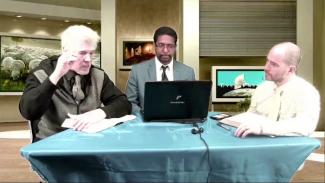What hope does the second coming of Jesus bring? Is there hope in the judgment? Why do the wicked seem to prosper while the righteous suffer? Does God answer the prayers of His people? How long will he allow evil to continue? Why does the hope of the Christian center on the resurrection of Jesus Christ?
2019 Broadcasts
Choose from all 2019 broadcasts or select a topic from the menu.What does it mean to live the gospel? How can the transformative power of God change our nature? What is the relationship between grace and works? What does it mean to have the image of God restored in humanity? What is the connection between John 3:16 and Revelation 14:6-7? Who is the gospel for?
What can we learn from Jesus, Paul, and James about ministry in the new testament church? How is the church to consider the needs of the less fortunate? Should we be partial to those who are rich? What does equality look like? What can we learn from the common wealth established by the early Christians?
How did Jesus' ministry and life address those who were poor, in need, and oppressed? How did Jesus' life and death address the concerns of those who are broken? What did the miracles of Jesus intend to teach His people? How can we understand Jesus' actions in the temple overthrowing the money changers?
Are sacrifices, offerings, song, praise, fasting and prayer all that God is concerned with? Can we neglect our stewardship toward one another or forget about compassion as long as we do acts of religious practice? Can worship and compassion ever be divorced? What are the weightier matters of the law? How did the prophets understand God in the context of oppression and how to treat the disenfranchised?
What can we learn about how God views the poor, oppressed, and underprivileged from the books of Psalms and Proverbs? What can we learn about the themes of mercy and justice? Is God’s judgment something to be feared or something to look forward to? What impact will the judgment have on those who do what is right? While many who are oppressed appeal to the highest court, the court in heaven, what can be expected when we ask God to do something?!
Was the Sabbath only for Jews or for all of humanity? How did Jesus put the Sabbath in its proper context? Who was to abstain from work and enjoy God’s rest? How can relieving the suffering and burdens of others lead to rest in God? Is it a sin to heal on the Sabbath? Why did God give the land a rest? What principles can we learn from Sabbath rest about Creation, redemption, and the pursuit of happiness?
What was God’s plan through the nation of Israel? How did the laws, commandments, and years of Jubilee send a powerful message to the surrounding nations about equity and caring for the marginalized and oppressed? Does God care about the less fortunate? What does it mean to love your neighbor in times of hardship? What is the difference between the letter and Spirit of the law?
What is the Elijah message and how does it relate to families especially in the end times? How did John the Baptist fulfill the prophecy of the coming Elijah that would return hearts? How does this connect with the three angel’s message? What impact should the gospel have on families?
The conclusion of the When I Feel Alone series: Discusses Naaman and his path from brokenness to restoration. What role does the church play in combating feelings of loneliness? Does God want us by ourselves because people in the church have flaws? What is God's plan for people who feel alone and how can we find companionship in Him? This episode focuses on restoration of relationships and recaps lessons from previous episodes.
As we have discussed in the past few episodes, Naaman had an illness which not only debilitated him physically, but also emotionally and socially. This week we are taking a look at Naaman’s path to finding healing. It’s interesting that Naaman’s healing would not come from a place that he recognized, it came from an unexpected source.
What influence can a Christian family have on those who visit their home? How does the story of King Hezekiah illustrate how we should witness when others come to our homes? What makes a positive influence in the home setting? What can we do to be better witnesses for Jesus? What if you're married to an unbeliever?












